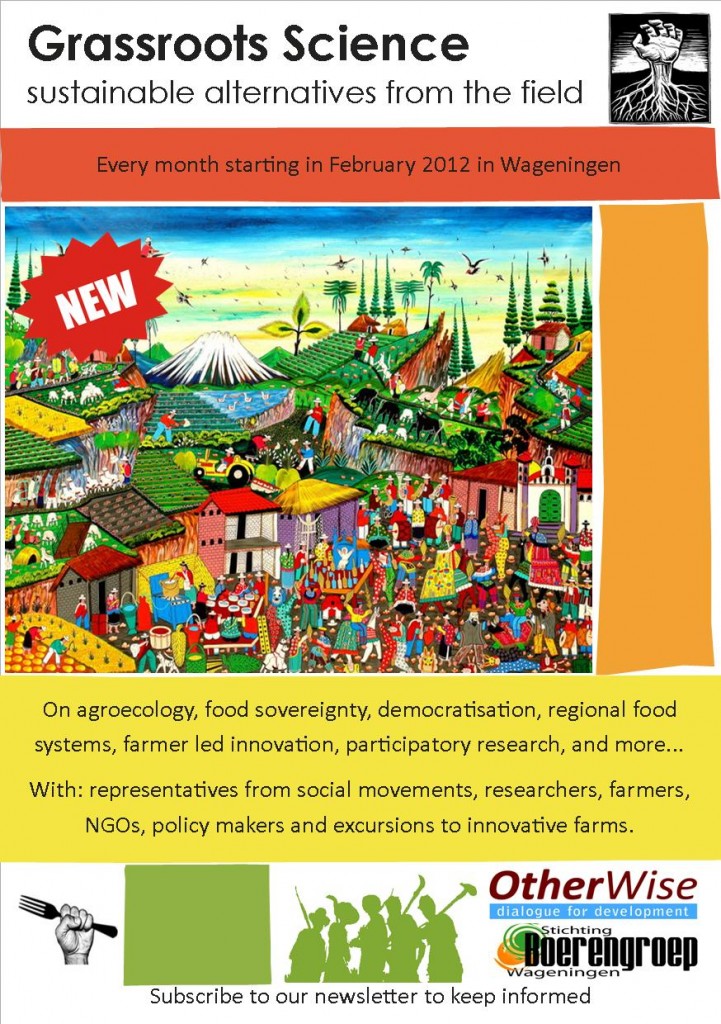socially driven alternatives that tackle global problems
“Socially driven” initiatives, by for example farmers, consumers, civil society organisations, sometimes in collaboration with scientists, constantly emerge in the face of poverty, social injustice, hunger, natural resource degradation, environmental decline and other global problems. Some of these initiatives contain practices that promise more sustainable livelihoods for the people on the ground while simultaneously tackling global problems. Many initiatives stand in stark contrast and sometimes even contradict with the “technologically driven” solutions implemented by many scientists and policy makers.
We invite you to participate in a journey full of exiting examples of good practices, local initiatives, grassroots organisations, farmer groups, and others who succesfully contribute to a better global food system. Not only is our food system to become more environmental and animal friendly, it should also be more social and fair to farmers world wide. With this new series, we aim to provide clear alternatives that work.
Everybody is welcome to join seperate evenings. Students who are interested in Grassroots Science can make this series into a capita selecta course. Reservations for each evening can be made here.
A Flyer with Poster and Programme to send to friends and colleagues can be found here.
All posts related to Grassroots science can be found here.
….
….
….
| Monday May 14 19:30h Forum register: please click here to reserve a seat
|
Farmer driven transformation in the Netherlands: sustainable practices and struggles with the state Douwe Hoogland (chair Noardlike Fryske Wâlden) Frank Verhoeven (Boerenverstand) Dutch agriculture is one of the most productive in the world. This however seems to have come at a price. Disease outbreaks have led to the killing of more than 40 million animals in the last 14 years, it is the only EU country that does not comply to EU groundwater standards, it is the largest user of antibiotics for meat production in the EU, it ranks in the top 3 of the world’s largest pesticide users and the farming population has shrunk by 36% in 15 years. Policy efforts and huge investments in research seem to have brought little change to this. Farmer-led initiatives have however emerged that promise to tackle some of these problems. Frank Verhoeven (Boerenverstand bv) and Douwe Hoogland (chair Noardlike Fryske Wâlden) will talk about two farmer-led environmental co-operatives in the Frisian Woodlands, who, in cooperation with researchers, have devised system innovation by re-integrating dairy farming with nature conservation and landscape management. To realise this struggles with state policies were inevitable. |
| Monday May 21 19:30h Forum Register: please click here to reserve a seat |
Beyond the commoditization of knowledge: Rethinking science and society relations Barbara van Dyck (Slow Science, fired at Catholic University of Leuven due to involvement in public protest against a Genetically Modified Potato field) Martijn Duineveld (assistant professor Cultural Geography) “Research on bees paid by the pesticide industry showing that it was not the pesticide that kills them…” (Zembla reportage, 12 maart 2011) “Research by dairy industry showing that milk is healthy…” (Resource, November 2010) “Researcher of architecture at the Catholic University of Leuven (Belgium) was fired because she supported a civil protest against the undemocratic imposing of genetically modified into society” (de Wereld Morgen, 4 Juni 2011) The relation between science and industry sometimes seems a love affair. What does this mean for society? What interest does science serve? Who poses the questions to be answered?Barbara van Dyck will present “Slow Science germs sprouting from a potato field ” (see also their two blogs: one blog is about the dismissal of Barbara van Dyck at the University of Leuven and the other blog is about how gm potatoes were introduced), and Martijn Duineveld will speak about “Potato Heads, nobody’s perfect: knowledge and power in the information age”. Click here for an essay written by Martijn Duineveld |
| Thurs May 24 20h !!Clock House Building!! (Generaal foulkesweg 37) Register: Please click here to reserve a seat |
Local innovation: what role for researchers and development organisations? Chesha Wettasinha (ETC international) The effectiveness of expert-led rural development projects and research is increasingly questioned. At the same time reports on successful grassroots and farmer-led initiatives are mounting. But how can scientists and development professionals get involved in, trigger or facilitate the emergence of these types of initiatives? These and other questions will be addressed in this workshop by Chesha Wettasinha (ETC International) using the Local Innovation (LI) and Participatory Innovation Development (PID) approaches and experiences from PROLINNOVA; an innovation network that operates in Africa, Asia, Latin America and the Pacific. |
| Monday June 4 19:30h Forum Register: please click here to reserve a seat |
Permaculture: reconnecting people with soil and food Fransje de Waard (De Waard Eetbaar Landschap) Fiona Morris (Transition Towns Vallei) Permaculture has emerged as a response to industrial agriculture and food. It seeks “to assist people to become more self reliant through the design and development of productive and sustainable gardens and farms” (Halmgrem 1997). Fiona Morris (Transition Towns Vallei) and Fransje de Waard (De Waard Eetbaar Landschap) will talk about the permaculture movement and practice. read more |
| Monday June 11 19:30h Forum Register: please click here to reserve a seat |
Seed Sovereignty Niels Louwaars (director Plantum NL) Edwin Nuijten (Stichting Zaadgoed) The US patent system is blowing over to Europe. Will patent claims from multinationals soon sue farmers in Europe? Niels Louwaars (director of Plantum) has been involved for several years in the debates on patents and breeder’s rights. See for example a publication on the “future of plant breeding…” or an interview in Wageningen World). He will explain the (im)possibilities for plant breeders and farmers in Europe and in developing countries. Edwin Nuijten (Stichting Zaadgoed) will tell us about alternative forms of plant breeding. |


